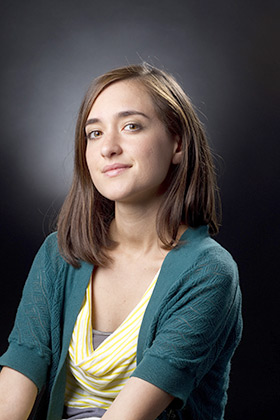
Related Link
“What’s it like to win one of the highest honors for a young journalist?” by Alexandra Zayas on Knight Blog
ANN ARBOR, Michigan — June 12, 2014 — Stories about the misuse of taxpayer money to fund private schools, life-threatening delays in blood testing of newborns and the plight of political asylum seekers won the Livingston Awards today. The $10,000 prizes for journalists under the age of 35 are the largest all-media, general-reporting prizes in the country.
The Livingston Awards also honor an on-the-job mentor with a $5,000 prize named for Richard M. Clurman, the distinguished Time, Inc. journalist.
Funding provided by the John S. and James L. Knight Foundation and the University of Michigan to support a new emphasis on digital media efforts and to build a permanent endowment resulted in an 85 percent increase in digital entries and a 50 percent increase in entries overall.
The winners were introduced by Jill Abramson, former executive editor of The New York Times and Livingston judges Ken Auletta of The New Yorker, John Harris of POLITICO and syndicated columnist Clarence Page at a luncheon in New York City.
“The judges have a remarkable record in singling out for early recognition journalists who go on to leadership, including Thomas Friedman, Christiane Amanpour, David Remnick and Michele Norris,” said Charles R. Eisendrath, founding director of the program at the University of Michigan. “Adding a prize for mentors who provide indispensable guidance at critical moments in a developing career helped complete an important circle of celebration.”
The 2013 winners are:
Local reporting
Christopher Baxter, 28, of The (N.J.) Star-Ledger for, “Private Schools, Hidden Riches.” Baxter’s investigation of spending practices at New Jersey private schools for students with disabilities uncovered questionable business practices, nepotism, high executive salaries and the private use of luxury cars. The schools are fully funded with taxpayer dollars, yet Baxter revealed how weak rules and spotty government oversight allow them to spend in ways few would tolerate of public schools.
“This investigation affirmed that when no one is watching government programs, the public can and often will be victimized by greed and waste,” said Baxter.
National reporting
Ellen Gabler, 33, and Allan James Vestal, 24, of Milwaukee Journal Sentinel for, “Deadly Delays.” Gabler found that systematic delays in testing blood samples of newborn babies for deadly disorders led to preventable deaths and disabilities. She spent five months requesting – fighting for – data from every 50 states and the District of Columbia. Using that data, Vestal built an interactive database providing a look at how individual hospitals across the nation perform at newborn screening. The series spurred dozens of states to make significant changes to address delays from keeping labs open on weekends to identifying problem hospitals and providing them with regular performance reports.
“Babies lives were at stake and no one had been paying attention,” said the team of Gabler and Vestal. “Reaction to the stories was immediate and widespread. Hospital and state officials could no longer deny what was happening. It was right there in the data.”
International Reporting
Luke Mogelson, 29, of the The New York Times Magazine, “The Dream Boat.” Posing as Georgian asylum seekers, Luke Mogelson and photographer Joel Van Houdt, paid smugglers for passage from Kabul to Jakarta to the Australian territory of Easter Island. Fifty-seven refugees, including nine children, endured a three-day journey on an unseaworthy 30-foot vessel. Mogelson describes the desperation of people willing to risk their lives to reach a country that will likely turn them away.
“This is the subtext to the plight of every refugee,” wrote Mogelson. “What ever hardship he endures, he endures because it beat the hardship he escaped. Every story of exile implies the sadder story of a homeland.”
Steven Brill received the Richard M. Clurman Award for his dedication to mentoring young journalists while on the job. Brill is the co-founder and CEO of Journalism Online. He founded Court TV, The American Lawyer and Brill’s Content. In 2006, Brill and his wife Cynthia founded the Yale Journalism Initiative to encourage young people to enter the journalism profession. The initiative has trained more than 100 Yale Journalism Scholars who are employed at news organizations.
In addition to Auletta, Harris and Page, the Livingston judging panel includes Christiane Amanpour of CNN and ABC News; Dean Baquet, executive editor of The New York Times; Charles Gibson, former anchor of ABC News; Ellen Goodman, author and co-founder and director of The Conversation Project; and Anna Quindlen, author.
About The Livingston Awards
The Livingston Awards at the University of Michigan honor outstanding achievement by journalists under the age of 35 in local, national and international reporting with prizes of $10,000. By recognizing the best young talent early in their careers, the Livingston Awards support the work of young journalists, create role models for the next generation of news consumers and advance excellence in journalism. For more, visit Livawards.org.
About the John S. and James L. Knight Foundation
Knight Foundation supports transformational ideas that promote quality journalism, advance media innovation, engage communities and foster the arts. The foundation believes that democracy thrives when people and communities are informed and engaged. For more, visit knightfoundation.org.
Contacts
Melissa Riley, (734) 998-7575, [email protected]
Laura Lessnau, (734) 647 -1851, [email protected]
